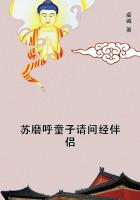"Une marque plus sure que toutes celles de Zadig."<1>((1) "Discours sur les revolutions de la surface du globe." Recherches sur les Ossemens Fossiles, Ed. iv, t.i. p.185.])--Cuvier.
It is an usual and a commendable practice to preface the discussion of the views of a philosophic thinker by some account of the man and of the circumstances which shaped his life and coloured his way of looking at things; but, though Zadig is cited in one of the most important chapters of Cuvier's greatest work, little is known about him, and that little might perhaps be better authenticated than it is.
It is said that he lived at Babylon in the time of King Moabdar; but the name of Moabdar does not appear in the list of Babylonian sovereigns brought to light by the patience and the industry of the decipherers of cuneiform inscriptions in these later years; nor indeed am I aware that there is any other authority for his existence than that of the biographer of Zadig, one Arouet de Voltaire, among whose more conspicuous merits strict historical accuracy is perhaps hardly to be reckoned.
Happily Zadig is in the position of a great many other philosophers. What he was like when he was in the flesh, indeed whether he existed at all, are matters of no great consequence.
What we care about in a light is that it shows the way, not whether it is lamp or candle, tallow or wax. Our only real interest in Zadig lies in the conceptions of which he is the putative father; and his biographer has stated these with so much clearness and vivacious illustration, that we need hardly feel a pang, even if critical research should prove King Moabdar and all the rest of the story to be unhistorical, and reduce Zadig himself to the shadowy condition of a solar myth.
Voltaire tells us that, disenchanted with life by sundry domestic misadventures, Zadig withdrew from the turmoil of Babylon to a secluded retreat on the banks of the Euphrates, where he beguiled his solitude by the study of nature.
The manifold wonders of the world of life had a particular attraction for the lonely student; incessant and patient observation of the plants and animals about him sharpened his naturally good powers of observation and of reasoning; until, at length, he acquired a sagacity which enabled him to perceive endless minute differences among objects which, to the untutored eye, appeared absolutely alike.
It might have been expected that this enlargement of the powers of the mind and of its store of natural knowledge could tend to nothing but the increase of a man's own welfare and the good of his fellow-men. But Zadig was fated to experience the vanity of such expectations.
"One day, walking near a little wood, he saw, hastening that way, one of the Queen's chief eunuchs, followed by a troop of officials, who appeared to be in the greatest anxiety, running hither and thither like men distraught, in search of some lost treasure.
"'Young man,' cried the eunuch, 'have you seen the Queen's dog?'
Zadig answered modestly, 'A *****, I think, not a dog.'
'Quite right,' replied the eunuch; and Zadig continued, 'A very small spaniel who has lately had puppies; she limps with the left foreleg, and has very long ears.' 'Ah! you have seen her then,' said the breathless eunuch. 'No,' answered Zadig, 'I have not seen her; and I really was not aware that the Queen possessed a spaniel.'
"By an odd coincidence, at the very same time, the handsomest horse in the King's stables broke away from his groom in the Babylonian plain. The grand huntsman and all his staff were seeking the horse with as much anxiety as the eunuch and his people the spaniel; and the grand huntsman asked Zadig if he had not seen the King's horse go that way.
"'A first-rate galloper, small-hoofed, five feet high; tail three feet and a half long; cheek pieces of the bit of twenty-three carat gold; shoes silver?' said Zadig.
"'Which way did he go? Where is he?' cried the grand huntsman.
"'I have not seen anything of the horse, and I never heard of him before,' replied Zadig.
"The grand huntsman and the chief eunuch made sure that Zadig had stolen both the King's horse and the Queen's spaniel, so they haled him before the High Court of Desterham, which at once condemned him to the knout, and transportation for life to Siberia. But the sentence was hardly pronounced when the lost horse and spaniel were found. So the judges were under the painful necessity of reconsidering their decision: but they fined Zadig four hundred ounces of gold for saying he had seen that which he had not seen.
"The first thing was to pay the fine; afterwards Zadig was permitted to open his defence to the court, which he did in the following terms:
"'Stars of justice, abysses of knowledge, mirrors of truth, whose gravity is as that of lead, whose inflexibility is as that of iron, who rival the diamond in clearness, and possess no little affinity with gold; since I am permitted to address your august assembly, I swear by Ormuzd that I have never seen the respectable lady dog of the Queen, nor beheld the sacrosanct horse of the King of Kings.
"'This is what happened. I was taking a walk towards the little wood near which I subsequently had the honour to meet the venerable chief eunuch and the most illustrious grand huntsman.
I noticed the track of an animal in the sand, and it was easy to see that it was that of a small dog. Long faint streaks upon the little elevations of sand between the footmarks convinced me that it was a she dog with pendent dugs, showing that she must have had puppies not many days since. Other scrapings of the sand, which always lay close to the marks of the forepaws, indicated that she had very long ears; and, as the imprint of one foot was always fainter than those of the other three, I judged that the lady dog of our august Queen was, if I may venture to say so, a little lame.















